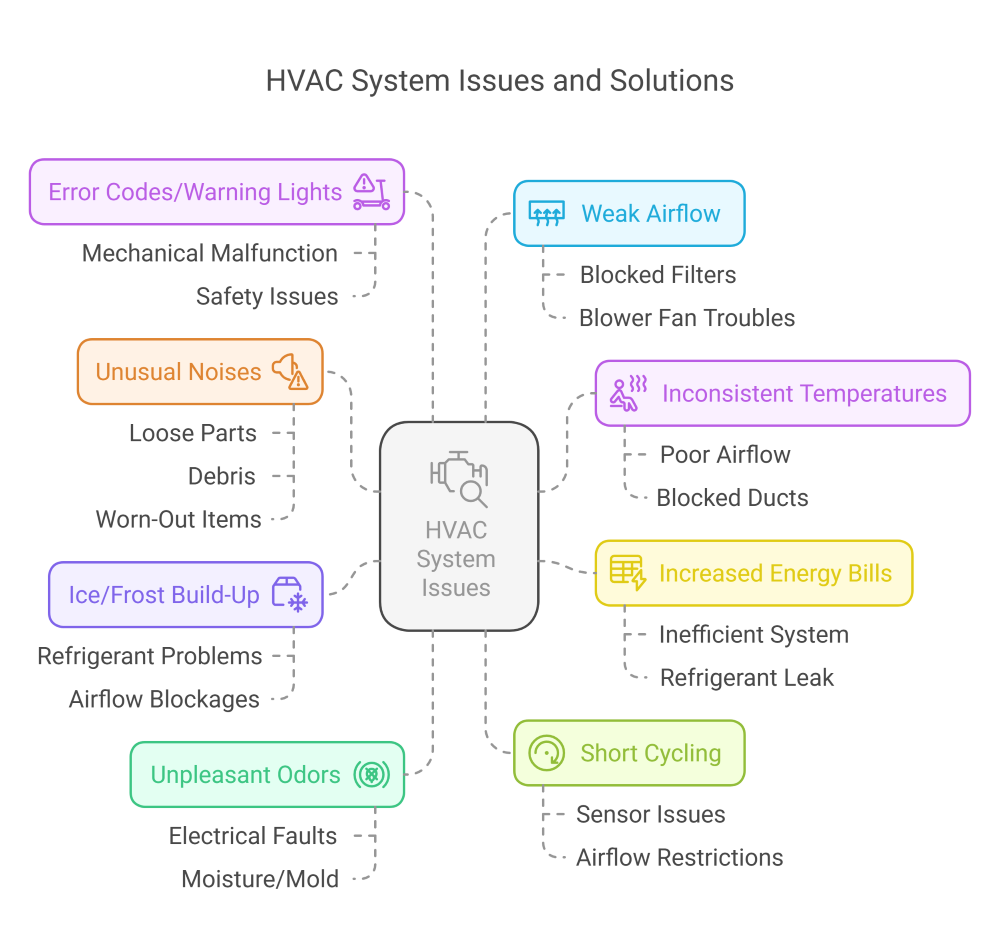Signs Your Heat Pump Needs Maintenance
- By Junior's Climate Control
- •
- 02 Mar, 2025

Heat pumps play a key role in many homes, delivering both heating and cooling throughout the year. Keeping your heat pump in top condition is essential for efficient performance, a longer operational life, and a consistently comfortable home. In this article, we’ll cover the common indicators that suggest your heat pump may need attention, outline the benefits of regular maintenance, and include an FAQ section to address your most pressing questions. If you’re in Setauket, Oakdale, East Islip, Bayport, Smithtown, or St. James and need expert service, Junior’s Climate Control is ready to help at 631-737-6759.
What Is a Heat Pump?
A heat pump is a versatile heating and cooling system that transfers heat between indoors and outdoors:
- Winter Operation: Pulls heat from outside air (or the ground) and moves it into your home.
- Summer Operation: Reverses the process, expelling heat from inside to keep your home cool.
Because of this dual function, heat pumps often use less energy than traditional heating and cooling systems.
The Benefits of Regular Heat Pump Maintenance
Routine maintenance isn’t just about preventing malfunctions—it has direct advantages for your comfort, safety, and budget:
- Improved Energy Efficiency
- Lower Energy Bills: Properly serviced units run more efficiently, reducing utility costs.
- Optimal Performance: Regular cleaning and fine-tuning keep the system operating at its best.
- Enhanced Comfort
- Consistent Temperatures: Prevents uneven heating or cooling, maintaining a stable indoor climate.
- Reduced Noise Levels: Tightening loose components and fixing minor issues can eliminate distracting sounds.
- Extended Equipment Lifespan
- Prevents Wear and Tear: Early detection and resolution of small problems help avoid costly, large-scale repairs.
- Long-Term Savings: A system that lasts longer will delay the need for an expensive replacement.
- Improved Air Quality
- Cleaner Operation: Frequent filter changes and cleaning minimize dust, allergens, and pollutants.
- Healthier Environment: Better indoor air quality supports a healthier living space.
- Enhanced Safety
- Early Problem Detection: Regular checkups can uncover electrical faults or refrigerant leaks before they become hazards.
- Peace of Mind: A system in good condition offers reassurance during extreme temperatures.
Signs Your Heat Pump Needs Maintenance
Identifying issues early can spare you from sudden breakdowns and hefty repair bills. Look out for the following:
- Unusual Noises
- Rattling or Banging: May indicate loose parts or debris inside the system.
- Humming or Buzzing: Persistent sounds could mean electrical problems or a failing motor.
- Reduced Efficiency and Performance
- Inconsistent Temperatures: Uneven heating/cooling might point to improper air distribution.
- Longer Run Times: Taking more time than usual to reach the set temperature may suggest declining efficiency.
- Increased Energy Bills
- Rising Costs: A sudden surge in energy usage without a change in household habits signals the unit is working too hard.
- Ice or Frost Build-Up
- Frozen Coils: Often linked to refrigerant leaks or airflow blockages.
- Excessive Frost: While mild frost is normal in winter, an overabundance can indicate a failing defrost cycle.
- Unpleasant Odors
- Burning Smell: Potentially caused by electrical issues or overheating parts.
- Mold or Musty Odor: Could suggest moisture accumulation or mold growth inside the system.
- Short Cycling
- Frequent On/Off: Quick cycling can accelerate wear and reduce overall efficiency.
- Error Codes or Warning Lights
- Control Panel Alerts: Modern systems show diagnostic codes; check your manual or contact a professional if you see any warnings.
- Weak Airflow
- Reduced Air Output: May be due to blower fan issues or clogged ducts.
Signs and Potential Issues
When diagnosing common HVAC issues, several signs and symptoms can indicate potential problems, each requiring specific maintenance actions. For instance, unusual noises in the system often point to loose parts, debris, or worn-out items, necessitating a thorough inspection and potential tightening or replacement of components, alongside cleaning the internal areas. Inconsistent temperatures may arise from poor airflow or blocked ducts, which can be remedied by cleaning filters and ducts and checking the blower fan for efficiency.
An increase in energy bills often signals an inefficient system or a refrigerant leak, requiring a detailed assessment of the system's efficiency and possibly repairing or recharging the refrigerant. Ice or frost build-up is another common issue, typically due to refrigerant problems or airflow blockages, and can be addressed by examining the coils, fixing leaks, and removing any obstructions.
Unpleasant odors may indicate electrical faults or the presence of moisture and mold within the system, prompting an inspection of electrical components, filter replacement, and moisture resolution. Short cycling, which is frequent turning on and off of the system, could stem from sensor issues or airflow restrictions. Evaluating the sensors and controls while ensuring proper airflow can mitigate this issue.
Error codes or warning lights are clear indicators of mechanical or safety malfunctions, requiring consultation of the maintenance manual and possibly scheduling a professional diagnosis. Lastly, weak airflow might be due to blocked filters or troubles with the blower fan, which can be resolved by changing the filters and cleaning and inspecting the fan and ductwork. Addressing these issues promptly helps maintain the efficiency and longevity of the HVAC system.
Note: Many of these concerns can be prevented or quickly corrected with regular professional maintenance.
What to Do If You Notice These Signs
- Schedule
a Professional Inspection
Call a qualified technician for a complete examination of your heat pump. A pro can spot underlying issues you might miss. - Perform
Routine Maintenance
Stay on top of tasks like filter changes, checking for ice, and ensuring clear airflow paths. Always refer to the user manual for guidance. - Monitor
Energy Bills
Keep track of monthly costs—if there’s a significant jump, consider scheduling an inspection. - Document
Observations
Maintain a simple record of any odd sounds or behaviors, which helps technicians make faster diagnoses. - Act
Early
Small issues can turn into serious (and expensive) problems if ignored. Address them quickly.
Additional Tips for Heat Pump Maintenance
- Regular Filter Replacement
- Timing: Swap out or clean filters every 1–3 months.
- Quality: Choose filters that match manufacturer recommendations.
- Keep the Outdoor Unit Clear
- Debris Removal: Clear away leaves, snow, and other obstructions.
- Open Space: Ensure nothing is blocking airflow around the unit.
- Check the Thermostat Settings
- Calibration: Confirm it’s accurately measuring temperature.
- Programmable Options: A programmable thermostat can optimize energy usage.
- Inspect Ductwork
- Leaks: Look for gaps or holes and seal them to avoid energy waste.
- Blockages: Make sure there are no clogs that hinder airflow.
- Schedule Annual Professional Servicing
- Comprehensive Checks: Professionals verify refrigerant levels, test components, and ensure everything is functioning correctly.
The Benefits of Timely Heat Pump Maintenance
Being proactive about maintenance can yield significant rewards:
- Enhanced Efficiency: Lower energy consumption and reduced utility bills.
- Less Risk of Breakdowns: Minor issues are dealt with before they escalate.
- Longer Equipment Lifespan: A well-maintained system can serve you longer.
- Steady Comfort: Uniform heating and cooling throughout the home.
- Eco-Friendly Operation: Reduced energy usage helps lower your carbon footprint.
Frequently Asked Questions (FAQ)
- How
often should I have my heat pump serviced?
Most professionals advise yearly check-ups. However, regular tasks—like filter changes—should occur every 1–3 months. - What
are the signs that my heat pump needs maintenance?
Look for odd noises, uneven temperatures, higher bills, ice build-up, strange odors, short cycling, error codes, and weaker airflow. - Can I
perform maintenance myself?
Yes, for simple tasks such as replacing filters and clearing debris. For more complex tasks (like refrigerant checks), consult a professional. - How do
regular maintenance services benefit performance?
Routine upkeep boosts energy efficiency, lowers the likelihood of sudden malfunctions, extends system life, and reduces costs over time. - What
if I see a sudden increase in my energy bills?
A large, unexplained spike could indicate your heat pump is struggling. Schedule an inspection to identify the cause. - How
can I arrange a maintenance appointment if I suspect issues?
For expert assistance, contact a trusted provider. Junior’s Climate Control offers comprehensive heat pump maintenance to keep your system in top shape.
Conclusion
Your heat pump plays a critical role in both your comfort and your home’s energy efficiency. Spotting warning signs like unusual noises, fluctuating temperatures, ice accumulation, or spiking energy bills can help you schedule timely maintenance and avoid expensive repairs. By performing regular upkeep and addressing problems early, you’ll enjoy a heat pump that runs smoothly, lasts longer, and keeps your living space consistently comfortable.
If you need professional heat pump maintenance, Junior’s Climate Control is here to help. Their skilled team can optimize your system’s performance and efficiency. To book an appointment or discuss any concerns you have about your heat pump, call 631-737-6759.
Invest in your home’s comfort and peace of mind by staying ahead of potential issues. A well-maintained heat pump not only operates more reliably but also saves you money during both scorching summers and chilly winters.





